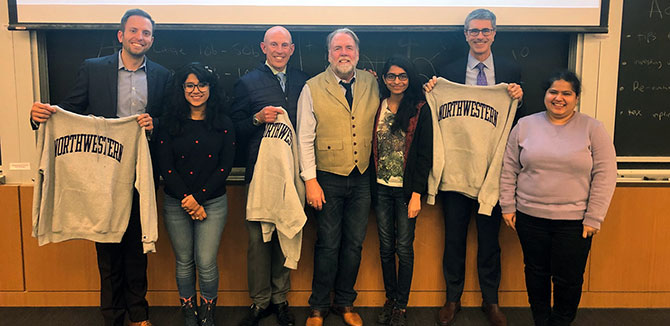The Ins and Outs of Financial Planning
Northwestern Master of Engineering Management (MEM) students got a first-hand look at investing and the world of Wall Street as part of their Strategic Management course.
By Ivonne Friday (MEM '17)
Last quarter, Master of Engineering Management (MEM) students in Strategic Management learned about financial planning and the investment world of Wall Street thanks to guest speakers from Northern Trust Bank, Murphy Financial Group, and Chicago Tube and Iron.
The conversation focused on Wall Street metrics and how key financial planning concepts like asset allocation, market indices, and the business cycle affect investments.
When it comes to Wall Street, no one knows how the market will behave and what stocks will be valued on a certain date — if we were able to figure that out, all financial analysts would be rich! The reality, though, is that the market ebbs and flows. The market reaches its peak at some point and then bottoms out at other times. It's a cycle.
With that in mind, when it comes to your personal finances, it is critical to have a clear understanding of your financial goals. Keeping a clear set of objectives is key in setting up the financial mapping for your goals while taking into consideration the current economic status.
The presenters drove home the point that when it comes to investments, playing the long game is always the safest option. When you compare one-year holding periods with five years or 15 years, the risk of the stock market almost disappears with the 15-year holding. That is because the market will have gone through all phases of its cycle.
Of course, if you do not have 15 years to wait, the risk increases. The less time your stocks are invested, the greater the risk you face. As the presenters in the class said: Hold your investments for 15 years or more and your risk of loss over time will be close to zero.
The conversation also touched on the question of whether it makes more sense to hold onto cash or invest it in bonds or stocks. The answer was clear: An investment in the stock market will see a far greater return in the long run than simply holding onto cash. Again, because the market goes through cycles, there may be occasional dips in the market, but that should not deter investors. If you play the long game, you have a far better shot at winning.
Thank you to all of our guest speakers, and a special thanks to Prof. Don McNeeley, who taught the Strategic Management course and coordinated the conversation.
Ivonne Friday (MEM '17) is Environmental, Health and Safety Manager at Chicago Tube and Iron.


